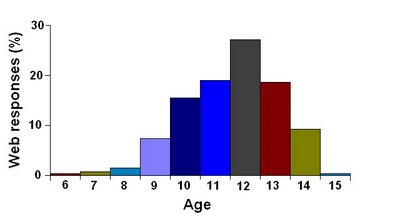The advance of Creative Future seems to be unstoppable. Staff in the Corporation are obediently carrying out the boss's orders without thinking of the consequences and how much damage it's doing.
Not so long ago the BBC claimed, under the Diversity banner, that it "aims to offer something for every age group and every cultural group as well as every part of the UK." Newsround's former editor, Ian Prince, was well aware of the concerns of young people about the lack of programmes for secondary school kids. Newsround received a great deal of negative feedback when the BBC announced that Byker Grove was to be axed (See blog 13 May 2006).
Since then Ian Prince has gone, to be replaced by Tim Levell.
Mr Levell has already been dutifully implementing "Creative Future" changes to target a slightly younger audience. However, despite CBBC being targeted at 7-11 year olds, my latest survey of Newsround website feedback shows that more than half of the web responses (around 55%) are from kids aged 12 or over. So the target appears to bear little relation to the ages of actual viewers.

An even more worrying finding of the latest survey is that, since the Creative Future announcement, it seems that Newsround is simply binning almost all emails from anyone aged 15 or more. The original survey, blogged on 13 April 2006 (about two weeks before Creative Future was unveiled,) showed about 14.4% of quoted feedback came from 15 year olds, but the latest study has the figure down to only 0.4%.
The latest analysis is based on 258 data from four web stories collected up until 12 September 2006 at 5pm. The relevant web pages are What do you think about healthier school meals?,... Back to school: Your thoughts,... What is your town or village famous for?,... September 11 anniversary: Your thoughts.
The difference between the findings of the survey in April and the latest survey is significant. It's extremely unlikely that the reason for the change in responses from 15 year olds is due to chance or differences in the audience demographic over the 5 month period since April. Much more likely is that someone from the production team has been binning feedback from 15 year olds - deliberate age discrimination is the only credible explanation. I wouldn't be surprised if they stop putting ages on some, or all, of the responses in future to try and disguise what's happening.
In 2003 and in the 2004 Charter Review the BBC said it was committed to "universal availability of BBC services". It said that it will continue to ensure that all its services remain universally available and free-to-air." Mark Thompson and his 'yes men' are making a mockery of the commitment.
All changes which are being made at the BBC go against the principle of Diversity. Age limits are more tightly defined, and those considered too old are simply being ignored while the BBC struggles to implement the "Teen Brand." And certainly without free-to-air tv, teens will be treated as second class. The Corporation also discriminates against its workforce - more about that subject in a future blog entry.
As stated previously, I believe one of the purposes of Creative Future has become an excuse to avoid issues of family diversity and inclusiveness. If this is the case the BBC is making yet another mistake. Educationalists believe that these are things which children should start to learn about from Key Stage 1 - a younger age than the new target for CBBC.
The half completed teen website, which is only for girls at the moment, is evidence of more gender stereotyping and shows that the BBC still has no sense of where it's going with its broadband based so-called "Teen Brand." The Teen Brand, if it ever gets off the ground, will clearly breach the BBC's stated commitment that its services remain universally available and free-to-air. Teenagers (and 12 year olds) have been betrayed by the BBC.
No comments:
Post a Comment